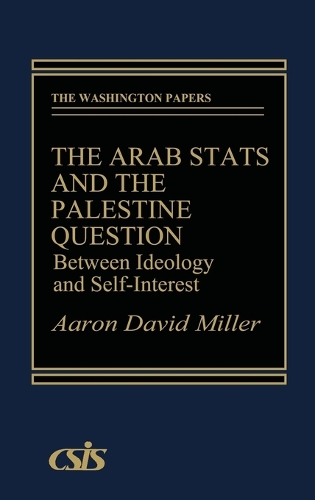
The Arab States and the Palestine Question: Between Ideology and Self-Interest
(Hardback)
Publishing Details
The Arab States and the Palestine Question: Between Ideology and Self-Interest
Bloomsbury Publishing PLC
Praeger Publishers Inc
19th May 1986
United States
Classifications
Tertiary Education
Non Fiction
327.5605694
Physical Properties
Hardback
114
Description
Miller has written extensively on the Middle East and has been an analyst with the Department of State. He is well-acquainted with the so-called `Palestine Question.' The focus of the present study is upon the Palestinian cause and its less than full cooperative relationship with Jordan, Syria, and Egypt. . . . This volume is an excellent complement to Arthur Day's East Bank/West Bank and is useful to the serious student of Middle East politics. Choice
Reviews
In the kaleidoscopic relationships between the PLO and the various Arab states, both sides have appeared at various times as either allies, adversaries, or both. This is why it is so essential to understand the complex interrelationship between the Arab states and the Palestinian movement--and the use that those same states are making of the whole Palestinian operation. Dr. Aaron Miller has penetrated this labyrinth in exemplary fashion to which he has devoted extensive study. It should prove an indispensable resource for all serious students of Middle East peace efforts.-Robert G. Neumann, Director of Middle East Programs, CSIS, Former U.S. Ambassador to Saudi Arabia, Morocco, and Afghanistan
Miller has written extensively on the Middle East and has been an analyst with the Department of State. He is well-acquainted with the so-called Palestine Question.' The focus of the present study is upon the Palestinian cause and its less than full cooperative relationship with Jordan, Syria, and Egypt. From the beginning of the conflict with Israel these frontline states each pursued policies based on self-interest that were not consistently aligned with Palestinian goals. These regimes, even when they supported the activities of the Palestine Liberation Organization (PLO), "were determined, particularly after 1967, to prevent the PLO's military operations from dragging them into an unwanted or untimely war with Israel'. Thus, Jordan in 1970 and 1971 cracked down on the PLO; Syria pursued its own irredentist interests; and Egypt broke with the PLO ( but not with the Palestinian cause) by signing a separate peace with Israel. This volume is an excellent complement to Arthur Day's Day's East Bank/West Bank and is useful to serious students of Middle East politics. Notes are included. For upper-division undergraduate and graduate students.-Choice
"In the kaleidoscopic relationships between the PLO and the various Arab states, both sides have appeared at various times as either allies, adversaries, or both. This is why it is so essential to understand the complex interrelationship between the Arab states and the Palestinian movement--and the use that those same states are making of the whole Palestinian operation. Dr. Aaron Miller has penetrated this labyrinth in exemplary fashion to which he has devoted extensive study. It should prove an indispensable resource for all serious students of Middle East peace efforts."-Robert G. Neumann, Director of Middle East Programs, CSIS, Former U.S. Ambassador to Saudi Arabia, Morocco, and Afghanistan
"Miller has written extensively on the Middle East and has been an analyst with the Department of State. He is well-acquainted with the so-called Palestine Question.' The focus of the present study is upon the Palestinian cause and its less than full cooperative relationship with Jordan, Syria, and Egypt. From the beginning of the conflict with Israel these frontline states each pursued policies based on self-interest that were not consistently aligned with Palestinian goals. These regimes, even when they supported the activities of the Palestine Liberation Organization (PLO), "were determined, particularly after 1967, to prevent the PLO's military operations from dragging them into an unwanted or untimely war with Israel'. Thus, Jordan in 1970 and 1971 cracked down on the PLO; Syria pursued its own irredentist interests; and Egypt broke with the PLO ( but not with the Palestinian cause) by signing a separate peace with Israel. This volume is an excellent complement to Arthur Day's Day's East Bank/West Bank and is useful to serious students of Middle East politics. Notes are included. For upper-division undergraduate and graduate students."-Choice
Author Bio
ller /f Aaron /i David
